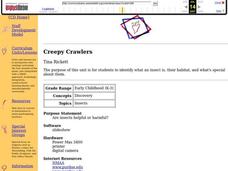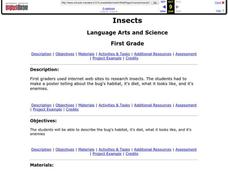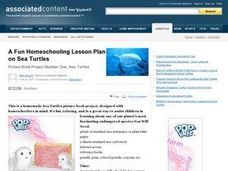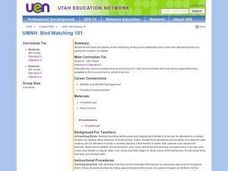Curated OER
Habitats of the World
Students complete a unit of eighteen lessons that cover climate, geography, location, plants, and animals of each of the five habitats. They are also introduced to habitat destruction and discuss ways to protect the environment. They do...
Curated OER
Creepy Crawlers
Students identify the characteristics of an insect and their habitat. They read books about insects, research different types of insects, and create their own insect art. The project also includes the creation of an insect song and...
Curated OER
Lake and Pond Study
Learners examine the habitat and community structure of a pond that could support Ospreys through games and worksheets. They then go on a field trip to a pond to evaluate the suitability of the pond as an Osprey habitat.
Curated OER
Animal Homes
Children visit one particular website to explore animals that live in different habitats. After visiting the website, they choose to research one habitat and the animals that live there. They create a poster about their animal and where...
Curated OER
Desert Tortoise Adaptations
Students observe the Desert Tortoise in its natural surroundings. For this adaptations lesson, students study and take pictures of an animal in its habitat, then design a PowerPoint which addresses adaptations, biodiversity, and threats...
Curated OER
Hide and Seek
Students explore animal characteristics by creating a poster presentation in class. In this animal habitat lesson, students visit the local zoo and identify which habitats certain animals are most comfortable in. Students answer study...
Curated OER
Insects
First graders view internet web sites, books and printed sources to research insects. They make a poster telling about the bug's habitat, it's diet, what it looks like, and it's enemies.
Curated OER
Rainforests: What Are They?
Second graders investigate rain forests by reading a habitat checklist. In this environment lesson, 2nd graders read the book The Great Kapok Tree, and discuss what characteristics make up a rain forest. Students explore a habitat...
Curated OER
Feet Are Neat
Students describe several types of bird feet and explain how each type helps a bird survive in its habitat. Students then match birds to their feet and mold bird feet out of clay.
Curated OER
Animals in Inspiration
Students research information on a specific animal. In this animal lesson plan, students use books to find information about an animals diet, habitat, appearance, and any other interesting facts. Students will use this information to...
Curated OER
Homeschooling Lesson: Sea Turtles
Students write down the names of common turtles and observe pictures of various types. In this sea turtles activity, students review names and features of these animals, label and draw a picture. Students research habitat, migration,...
Curated OER
Biomes/ecosystems
Fifth graders examine ecosystems through a variety of activities including an Internet hunt, work at centers, and building a diorama on a specific habitat.
Curated OER
Move To a Healthier Aquatic Balance
Fourth graders examine aquatic orgnaisms and how enviromental chages affect them. This factors include: temperature, Ph, oxygen, nutrients, and pollutants. They also explore habitat quality (erosion). Students compile data and create...
Curated OER
Book Making
Students make connections with real life experiences and the two languages, including Spanish and English. They create their own books in this project lesson plan to take home and read with their families. Students also use a digital...
Curated OER
Exploring the Beach
Students explore the beach. In this marine habitat instructional activity, students inspect sand grains, design beach profiles, classify marine life, and examine natural beach habitats. Students use spreadsheets to record data from their...
Curated OER
Interesting Insects
Students discover the characteristics of insects. They explore insects through cooperative learning, group projects, hands on activities, and poetry. They gain knowledge of insect life cycles, habitat, and physical characteristics.
Curated OER
Frogs and Camouflage
Students view a variety of pictures of frogs and discuss camouflage and habitat adaptation. Students look at color, skin texture, shape, size, eyes, and surroundings as well as the need for the camouflage. Students then design a frog...
Curated OER
Bird Watching 101
Fourth graders examine the basics of bird watching, finding and interpreting bird clues and attracting birds to a particular location or habitat. They go on a birding hike after a lecture on what to look and listen for in the woods.
Curated OER
Dinosaur Designs
Students study dinosaurs in science and conduct online research to gather written information about his or her dinosaur. Then, in art class, they sketch their dinosaur and create an accurate three-dimensional dinosaur model out of paper...
Curated OER
Know It All: Seals! Teaching Plan
Students discover information about seals, including behavior and habitat. In this early childhood lesson plan, students identify various aspects about seals. Students create an illustration or painting of their favorite seal, and...
Curated OER
The Insect Files
Students are provided with a physical description of the insect, in words and graphics, including body parts, special adaptations, color, and so on. They explore and report on all four elements of an insect's habitat: food, water,...
Curated OER
Convening, Creating, and Conventioneering
Students study coelenterates. In this science lesson, students author a story regarding the life cycle of coelenterates following an in depth study of the creatures.
Curated OER
How Animals Meet Their Needs
Fourth graders research the Internet for facts relating to the animal of their choice. They use information from their Internet search to complete their animal project. TLW use his or her own words when writing their report.
Curated OER
Brine Shrimp Anatomy
Third graders investigate the anatomy of the brine shrimp. They construct a model of the shrimp to demonstrate the anatomical parts of the shrimp. Students research the different factors that contribute to shrimp survival. Then they...

























